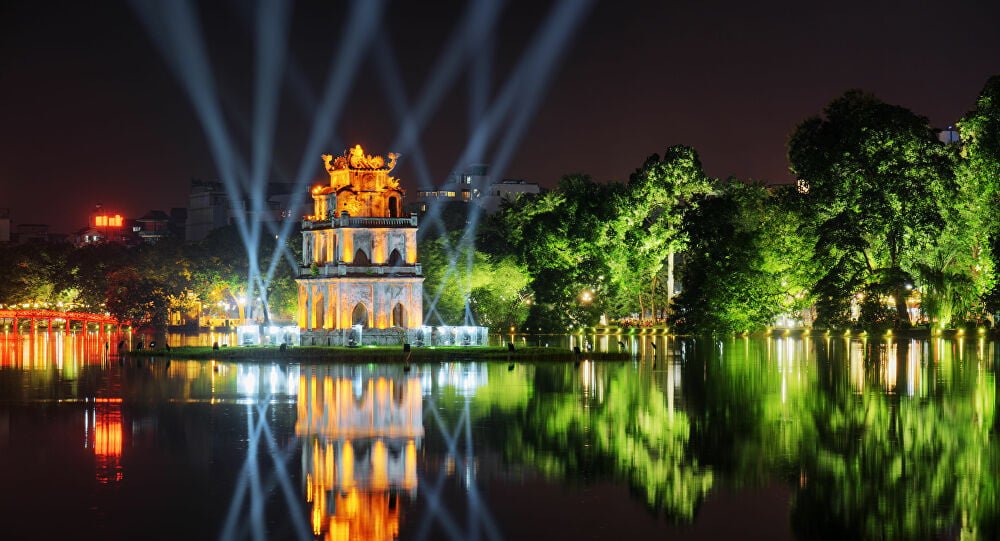
Nestled in the heart of Hanoi, Hoan Kiem Lake and Ngoc Son Temple stand as serene and captivating landmarks that offer a peaceful respite from the bustling city streets. Surrounded by the vibrant energy of the Old Quarter, these iconic attractions hold deep cultural and historical significance, making them must-visit destinations for any traveler seeking to explore the rich heritage of Vietnam’s capital city. Join us as we embark on a journey to discover the enchanting beauty and tranquil ambiance of Hoan Kiem Lake and Ngoc Son Temple.
Hoan Kiem Lake, meaning “Lake of the Returned Sword,” is a shimmering gem in the heart of Hanoi. Legend has it that the lake is home to a magical sword, which was given to Emperor Le Thai To by a divine tortoise and later returned to the lake. As you approach the lake’s shores, you’ll be captivated by its serene beauty and the peaceful atmosphere that envelops the area.
Take a leisurely stroll along the tree-lined promenade that encircles the lake, allowing the gentle breeze to caress your face. The picturesque scenery, with its emerald green waters, is enhanced by the vibrant colors of blooming flowers and lush greenery. Along the way, you’ll encounter several notable landmarks that add to the allure of the lake.
One such landmark is the iconic red bridge, Huc Bridge, which connects the shore to the Ngoc Son Temple. This elegant structure, adorned with traditional Vietnamese architectural elements, creates a striking contrast against the surrounding natural beauty. Walking across the bridge is a memorable experience that immerses you in the mystical ambiance of the lake.
Perched on a small island in the middle of Hoan Kiem Lake, Ngoc Son Temple beckons visitors with its timeless charm and spiritual significance. Accessible via the Huc Bridge, this temple is dedicated to several revered figures, including the scholar Van Xuong and the military leader Tran Hung Dao.
Upon entering the temple, you’ll be greeted by the intricate architecture and ornate details that reflect Vietnam’s rich cultural heritage. The temple’s main hall houses a collection of ancient artifacts, including a preserved specimen of the legendary tortoise, symbolizing wisdom and longevity. As you explore the temple’s various halls and chambers, you’ll be immersed in a world of spirituality and tranquility.
While at Ngoc Son Temple, two notable features that cannot be missed are the Pen Tower and the Ink Slab. The Pen Tower, or Thap But in Vietnamese, is a slender structure that stands tall on the temple grounds. Symbolizing knowledge and wisdom, it is a reminder of the importance of education in Vietnamese culture.
Adjacent to the Pen Tower, the Ink Slab, or Duong Van Ngu, is a large stone block used for grinding ink in traditional calligraphy. Crafted from a single piece of stone, this ancient artifact represents the artistry and cultural heritage of Vietnam. These two landmarks serve as reminders of the country’s deep-rooted appreciation for learning, literature, and the arts.
Hoan Kiem Lake and Ngoc Son Temple offer a sanctuary of tranquillity amidst the vibrant city of Hanoi. Take a moment to sit on one of the benches that dot the lake’s promenade, allowing the peaceful ambiance to wash over you. Watch as locals practice tai chi or engage in friendly conversation and observe the gentle ripples on the lake’s surface.
For a truly immersive experience, visit Hoan Kiem Lake early in the morning or during the evening, when the area is aglow with the soft light of lanterns and the sounds of traditional music fill the air. The tranquil beauty and spiritual aura of the lake and temple create a serene atmosphere that draws both locals and visitors alike, fostering a sense of peace and reflection.
Hoan Kiem Lake and Ngoc Son Temple stand as iconic symbols of Hanoi’s cultural heritage and offer a serene haven in the heart of the bustling city. From the tranquil ambiance of the lake to the spiritual significance of the temple, these attractions provide a glimpse into Vietnam’s rich history and traditions. Whether you’re seeking a moment of tranquility, a deeper connection to Vietnamese spirituality, or simply a respite from the vibrant city streets, a visit to Hoan Kiem Lake and Ngoc Son Temple is sure to leave a lasting impression and create cherished memories of your time in Hanoi.
Subscribe to see secret deals prices drop the moment you sign up!
